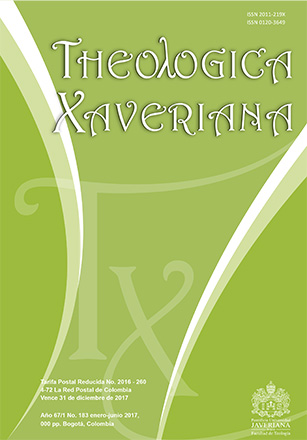Abstract
The article intends to examine the articulations between the methods in Theology and the Social Sciences method of Participatory Action Research (PAR), taking into account the importance that the latter has for the development of contextual theologies. Methods in Theology are briefly examined and the Participatory Action Research’s method is presented. Such contextualization shows the possibilities and limits of this methodological articulation. Besides, it invites us to continue the theological journey that takes seriously into account the autonomy of reality and seeks to discover God’s revelation in reality, which enlightens and effectively transforms it.
Assmann, Hugo. Teología desde la praxis de liberación. Ensayo teológico desde América dependiente. Salamanca: Sígueme, 1976.
Boff, Clodovis. Teología de lo político: sus mediaciones. Salamanca: Sígueme, 1980.
_____. Teoría do método teológico. Petrópolis: Vozes, 1998.
Concilio Vaticano II. “Constitución pastoral Gaudium et spes (1965)”. Vatican, http:// www.vatican.va/archive/hist_councils/ii_vatican_council/documents/vatii_const_19651207_gaudium-et-spes_sp.html# (consultado el 12 de octubre de 2015).
Fals Borda, Orlando. El socialismo raizal y la Gran Colombia bolivariana. Investigación acción participativa. Caracas: Promoción Social, 2008.
_____. “Globalización y segunda República”. En Cuadernos del pensamiento crítico latinoamericano. Buenos Aires, Clacso, 2008. Disponible en: http:// bibliotecavirtual.clacso.org.ar/ar/libros/secret/cuadernos/fals/fals.pdf
(consultado el 30 de agosto de 2016).
_____. Una sociología sentipensante para América Latina. Buenos Aires: Clacso, 2009.
Garavito Villareal, Daniel de Jesús. “La revelación y la actividad humana: recepción teológica de la constitución Dei Verbum en clave hermenéutica de la apropiación”. Ponencia para la sustentación de su tesis de Doctorado, 16 de julio de 2014 (sin publicar).
García Sánchez, Bárbara Yadira y Javier Guerrero Barón. Núcleos de Educación Social, NES. Bogotá: Universidad Distrital Francisco José de Caldas, 2012. Disponible en: http://ascun.org.co/media/attachments/nucleos_de_educacion_
social_nes.pdf (consultado el 3 de marzo de 2015).
González, Antonio. Teología de la praxis evangélica: ensayo de una teología fundamental. Santander: Sal Terrae, 1999.
Gutiérrez, Gustavo. La teología de la liberación. Perspectivas. Lima: CEP, 1971.
Habermas, Jürgen. Conocimiento e interés. Madrid: Taurus, 1982.
Kirchner, Alicia. “La investigación acción participativa”. Foro Latinoamérica, http://forolatinoamerica. desarrollosocial.gov.ar/galardon/docs/Investigaci%
C3% B3n%20Acci%C3%B3n%20Participativa.pdf (consultado el 3 de marzo de 2015).
Leal Eduardo. “La investigación acción participación, un aporte conocimiento y a la transformación de Latinoamérica, en permanente movimiento”. Revista de investigación 67, Vol. 33 (2009): 14-34. Disponible en: Scielo, http://www2.scielo.org.ve/pdf/ri/v33n67/art02.pdf (consultado el 3 de marzo de 2015).
Lonergan, Bernard. Método en teología. Salamanca: Sígueme, 1994.
Park, Peter. “Qué es la investigación acción participativa. Perspectivas teóricas y metodológicas”. En La investigación acción participativa. Inicios y desarrollos, editado por María Cristiana Salazar, 135-174. Bogotá: Magisterio, 2011.
Parra, Alberto. “De camino a la teología de la acción”. Theologica Xaveriana 175 (2013): 143-171.
_____. “Interacción del saber científico en perspectiva teológica”. Theológica Xaveriana 112 (1994): 401-425.
_____. Textos, contextos y pretextos. Teología fundamental. Bogotá: Pontificia Universidad Javeriana, Facultad de Teología, 2003.
Tamayo-Acosta, Juan José, Nuevo paradima teológico. Madrid: Trotta, 2003.
Torres, William. “Fals Borda y su obra. Reseña de Ciencia y compromiso”. Boletín cultural y bibliográfico Vol. XXIV, 12 (1987): 88-89. Disponible en: Boletín cultural y bibliográfico del Banco de la República, http://publicaciones.banrepcultural.org/index.php/boletin_cultural/issue/view/96 (consultado el 3 de marzo de 2015).
Vélez Caro, Olga Consuelo. El método teológico. Fundamentos, especializaciones, enfoques. Bogotá: Pontificia Universidad Javeriana, Facultad de Teología, 2008.
This journal is registered under a Creative Commons Attribution 4.0 International Public License. Thus, this work may be reproduced, distributed, and publicly shared in digital format, as long as the names of the authors and Pontificia Universidad Javeriana are acknowledged. Others are allowed to quote, adapt, transform, auto-archive, republish, and create based on this material, for any purpose (even commercial ones), provided the authorship is duly acknowledged, a link to the original work is provided, and it is specified if changes have been made. Pontificia Universidad Javeriana does not hold the rights of published works and the authors are solely responsible for the contents of their works; they keep the moral, intellectual, privacy, and publicity rights.
Approving the intervention of the work (review, copy-editing, translation, layout) and the following outreach, are granted through an use license and not through an assignment of rights. This means the journal and Pontificia Universidad Javeriana cannot be held responsible for any ethical malpractice by the authors. As a consequence of the protection granted by the use license, the journal is not required to publish recantations or modify information already published, unless the errata stems from the editorial management process. Publishing contents in this journal does not generate royalties for contributors.



